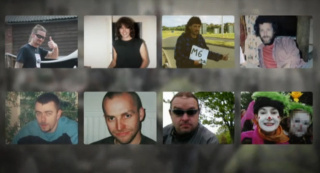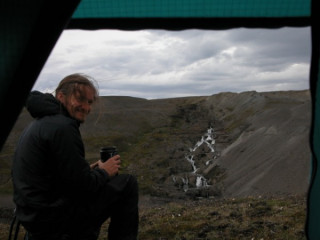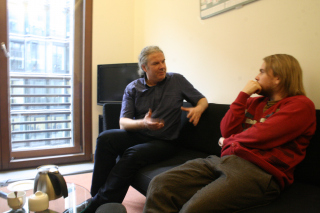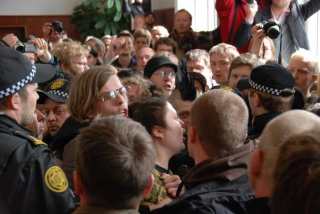Snorri Páll Jónsson Úlfhildarson Grapevine
Each time a free-floating rumour gets confirmed, and past political behaviour becomes a scandalous spectacle, one cannot resist wondering if such conduct might be going on today. This was the case in 2006, after a grand exposure of espionage the Icelandic state aimed at socialists during the Cold War. During parliamentary discussions following the revelation, Mörður Árnason, MP for the Social-Democratic Alliance (“Samfylkingin”), highlighted the importance of revealing if similar espionage was indeed occurring in present times. If so, he asked, “how is it being conducted? […] Which foreign states have been able to access this information?” Quite typically, those questions were never answered.
Half a decade later, in late 2010, it was revealed that a British police officer, one Mark Kennedy, had travelled around Europe for seven years disguised as environmental and anti-capitalist activist ‘Mark Stone’ and was collecting information about various activist movements and, in some cases, acting as an agent provocateur. Along with the UK, Denmark, Germany, Italy and France — to name but a few of the places where he worked — he did a stint in Iceland’s Eastern highlands in the summer of 2005. In Iceland, he attended a protest camp organised by the environmentalist movement Saving Iceland which targeted the construction of the gargantuan Kárahnjúkar dam and American aluminium giant Alcoa’s smelter in Reyðarfjörður.
The revelation mostly stayed within activist circles and publications, until early 2011, when a public expose of the spy’s true identity lead to the collapse of a UK trial against six climate-change activists, in which Mark’s secretly obtained evidence played a key role. British newspaper The Guardian then took up the case, and the Mark Kennedy saga started to snowball contemporaneously with the broader attention it received, bringing to light a number of other undercover spies.
Sex, Secrecy And Dead Children’s Identities
Shortly after Mark was exposed, Irish and German authorities admitted that he had worked within their jurisdictions and with their knowledge. Due to the ongoing efforts of Andrej Hunko — MP for German left party Die Linke — a truckload of information regarding European cross-border undercover police operations has since seen the light of day.
A recent book on the matter, written by Guardian journalists Paul Lewis and Rob Evans, brings further context to the affair — the mapping of at least 30 years of police espionage and infiltration of environmentalist, anti-racist and anarchist movements in the UK and elsewhere. Among the information revealed, the authors explain how the undercover officers at the Special Demonstration Squad — the undercover unit responsible for the infiltration — had the modus operandi of taking up identities of dead children in order to build up credible alter-egos based on the short lives of real persons.
It has also been revealed that Kennedy — along with others in his position — enjoyed several intimate relationships with some of his prospects, using sex to build up trust and gather information. One infiltrator, Bob Lambert, even fathered a child with one of these women, only to disappear as soon as his undercover employment became too risky. Eight British women who were victims of this tactic have pressed charges against the spies’ employer, the Metropolitan Police, due to the psychological damage they suffered. In a recent episode of investigative TV programme ‘Dispatches’ on Channel 4, some of them described their experience as having been mass-raped by the state, as they would never have consented to sleeping with the police officers had they been aware of their real identities. Adding insult to injury, their claims will not be heard openly — the British High Court recently ruled that it would take place in the secret Investigatory Powers Tribunal.
Saving Hell’s Angels
Enter Iceland, where the big question concerned whether Mark Kennedy had operated with or without the Icelandic authorities’ knowledge and approval. According to the country’s penal code, a foreign party or state’s espionage that takes place within the jurisdiction of the Icelandic state — or is directed at something or someone therein — is illegal and punishable with five-years imprisonment. Had Mark operated without the authorities’ knowledge, it should have caused an international conflict. If he, on the other hand, collaborated with the Icelandic police, it would have equaled the invoking of proactive investigative powers, which the Icelandic police apparently didn’t have at that time.*
Thus the affair entered Iceland’s parliament in late January 2011. Assuming the former version being more likely than the latter, the above-mentioned MP Mörður Árnason asked his fellow party-member and then-Minister for Foreign Affairs, Össur Skarphéðinsson, about the government’s possible actions regarding the matter. After a few lousy personal jokes thrown between the two, Össur claimed he would wait for a report on the matter — conducted by the National Commissioner of the Icelandic Police — which Ögmundur Jónasson, MP for the Left Greens and then Minister of the Interior, had already requested.
But when finally published by the Commissioner’s National Security Unit in May 2011, it was pretty much impossible to estimate the relevance of the report, as the details of Ögmundur’s request were never made public. It was, however, clear that the National Commissioner — whose report literally equated environmentalist activists with Hells Angels — wasn’t about to bring any concrete information out into the public domain.
Lost In Information
Although admitting that the police received information about the activists and their plans via domestic and foreign sources, and that the Icelandic police collaborated with foreign police authorities regarding the protests, the report’s authors nevertheless fully dodged the question regarding the Icelandic police’s alleged collaboration with Mark Kennedy. The main conclusion of the report merely found that “during an overhaul of data at the National Commissioner’s office, no information has come forth enabling an answer regarding whether this agent provocateur […] was here in collaboration with or without the knowledge of the Icelandic police in 2005.”
Despite criticism from Saving Iceland and Árni Finnsson, head of the Iceland Nature Conservation Association, which both accused the minister of condoning cover-ups and evasions by accepting these results, Ögmundur never really touched officially on the issue again. Neither did Össur nor Mörður or — as a matter of fact — anyone else from the establishment.
The truth regarding Kennedy’s operations in Iceland is still not publicly acknowledged, and the absurdity of the issue as it now stands is probably best described by Ögmundur’s own words, taken from an article published on Smugan — a now defunct leftist news-site — and his last public remark on the report: “The National Commissioner’s report states that the Icelandic police obtained information from abroad concerning the protests at Kárahnjúkar, but that the police do not have information about how this information was obtained.”
—
* It is, in fact, questionable if the Iceland police had proactive investigative powers or not. As a result of weak laws and a lack of regulations, it actually seems that until 2011 the police had just about carte blanche regarding whom to spy on and for what reason. See more about it here.
—
Click here to go to the support site for the women’s legal action against the Metropolitan Police.
Watch the above-mentioned Dispatches show here below:
The Police’s Dirty Secret (47mins – Dispatches/Channel4 – 24JUN2013) from Casey Oliver on Vimeo.








